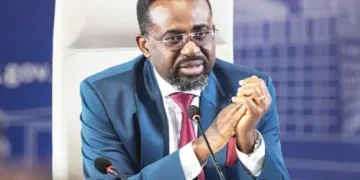“This Is Not Law, It’s Power Play”: ACEP’s Benjamin Boakye Slams Government’s Handling of Damang Mine Lease
A chilling warning is now echoing from Ghana’s leading energy policy think tank, the Africa Centre for Energy Policy (ACEP): what’s unfolding in Damang is not a lawful regulatory action but a takeover masked in bureaucracy, driven more by personal interest than public benefit.
Benjamin Boakye, the Executive Director of ACEP, spoke candidly to NorvanReports when the Managing Editor asked a question during a press conference and said, “It appears in this situation that it is the hearts and minds of the interpreters of the law that is in action, and not the law itself,” he stated. “And that is problematic.”
The government’s decision not to renew the mining lease of Abosso Goldfields Limited (AGL), one of Ghana’s longstanding producers, has already sparked concern from civil society and industry observers. But Boakye’s response offers the most searing critique yet, pointing to what he describes as a troubling pattern of legal distortion, strategic opacity, and potential corruption.
No Plan, No Audit, No Clarity
Mr. Boakye challenged the legitimacy of the state’s actions, starting with the forensic audit that the Minerals Commission had promised AGL in writing following its lease rejection. “The forensic audit is the Commission itself that told the company they were sending auditors,” he recalled. “If that action is in our interest, why have you not done it, and are you sacking the company?”
It’s a damning question. If the company is indeed in breach of obligations or withholding payments, why eject them before the audit? What if, Mr Boakye posits, they owe Ghana a billion cedis in outstanding royalties or taxes?
“Assuming you sack the company today and you realize later that they owe us 1 billion, where are you going to take it from?” he asked. “Because once you sack them from that field, the company can fold up.”
This, he noted, is not just a question of governance but rather a question of financial prudence and national interest.
The Absence of a Mining Successor
Equally concerning is the government’s glaring failure to articulate what comes next. “If the government is saying that you want to take up a mine, does the government have a company that is qualified to mine? It’s a legitimate question,” Boakye pressed. “The government doesn’t own a mining company.”
In other words, the Damang asset is being seized, but no roadmap has been shared for future operations. “You are taking over a mine, and you are not telling the good people of Ghana how you are going to produce from the mine.”
This, he argues, is inconsistent with any good-faith governance. It also raises doubts about the claim that the mine is depleted. “If there are no reserves, why did they rush to take it? So, you are promising the workers that there are no reserves to mine, but still want to take it? That means you know there are reserves there.”
Boakye believes that the government is ignoring years of reserve data submitted to the Commission. “You can go back to that data and compare it with the extracted resource to see whether the company has exhausted the reserves… There are no numbers to this conversation except the bully tactics to expropriate the mine.”
The Smell of Something Worse
For Mr Boakye of ACEP, these inconsistencies suggest more than just bureaucratic sloppiness.
“Sometimes, under the cover of protecting public interest, are pregnant with individual and personal interest,” he said. “And these are clear symptoms that when you cannot explain the position of the law on these matters, it is often corruption and greed that drives those decisions.”
He cited ACEP’s long experience with similar past episodes—the Ameri deal, the Agyapa royalties’ fiasco, and the Springfield-ENI unitisation directive, where decisions taken in the name of the public turned into multi-billion-cedi losses for the state, wasting funds to go to arbitration and could not win the case.
“We don’t want to pre-empt the decision of a court,” he said. “But we want the government to follow the rules.” Failure to do so, he warned, could land Ghana in another expensive international arbitration.
Conclusion: A Fight for Accountability
The Executive Director of ACEP, Mr Boakye’s remarks amount to a direct challenge to the Ministry of Lands and Natural Resources and the Minerals Commission. They must come forward and explain:
- Why the forensic audit never occurred.
- Why existing reserve data has been dismissed.
- Who will run the mine post-expropriation?
- And how this approach aligns with Ghana’s laws and national interests.
Until then, the perception will persist that this is not a regulatory decision, but a raw power grab, cloaked in legalese, with a shadowy agenda.
If Ghana is to avoid yet another costly mining dispute and the spectre of Damang becoming a ghost town, now is the time to demand answers, not silence.








